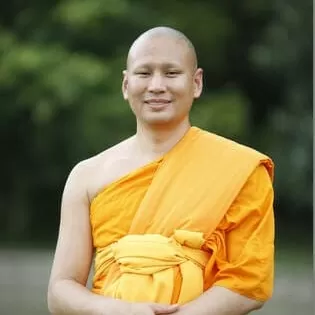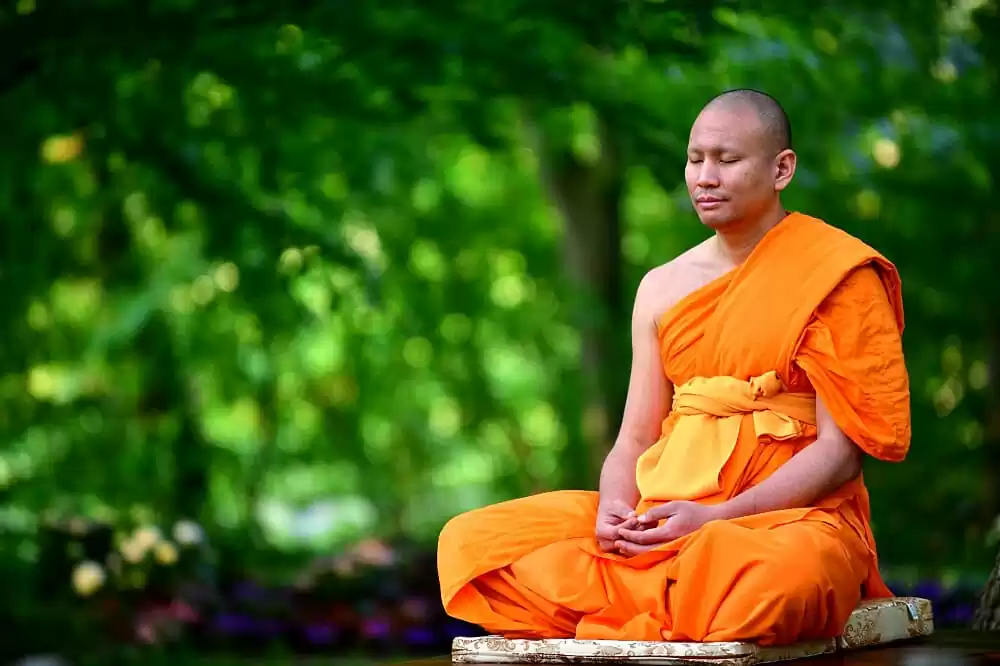Buddhism, Enlightenment and Simplicity – An Interview with A Monk Part 2
We hosted an interview with Buddhist Monk Pasura from Thailand. Monk Pasura is one of the Monks who trained Samavira’s founder Lauren when she lived in a Buddhist monastery in Thailand.
We spoke about Buddhism, enlightenment, simplicity and more. Enjoy the read! 🙂
Why did you decide to become a monk? Why are you on this path?
Well, before I became a monk, I was just like everybody else. I attended school, and have a master’s degree. I had a few jobs, my last job before I became a monk was as a flight attendant. And I had this philosophy of work hard, play hard, kinda person. So I was a workaholic, but I also enjoyed life to the fullest. So at the age of 28, is when I started to feel fed up with how things were.
I wanted to take a little break, just to sort of see myself in a new direction after turning 30. So that’s when I decided to be a monk for four months because in Thailand there’s a tradition for a man to be a monk for a short period of time for a few weeks or a few months. So that’s why I decided to become a monk for four months.
At first it was hard. Adjusting to this new life was not easy. But as time goes by it gets kind of peaceful that it really feels crowded, I guess. And that really gave me a different perspective on how to see life in something that really called happiness. So that’s how I decided to extend it until now. It’s been 17 years.
We hosted an interview with a Buddhist Monk Pasura from Thailand. Monk Pasura is one of the Monks who trained Samavira’s founder Lauren when she lived in a Buddhist monastery in Thailand. Enjoy! 🙂
Would you say it has become easier over time or..?
It is a lifestyle. Despite the many rules and restrictions, once you get used to those disciplines and rules, it becomes part of your life. That the moment when it becomes a part of your life it’s actually easy to just do it without feeling as if you have to force yourself.
At the end of the day, all the rules and disciplines that we have, serve one main purpose. Which is to help us live a mindful life. Because basically, all the rules are about what kind of necessities we should have, how we should look after them, what kind of behavior we should have, and the manner in which we should conduct ourselves.
Such things really help us to become more mindful. And mindfulness also supports the practice of meditation. Generally, the disciplines that we have, are in support of the practice of meditation. And if the goal is to get deeper into the meditative experiences, that will be ideal.
What’s a day in the life of a Monk? Like, what does your life look like, how would you explain it to people like us?
Generally, just like everybody, eat, sleep, meditate, but a lot more meditation I guess, haha. So the day starts at about 4.30am or five o’clock in the morning, followed by meditation till around seven o’clock. Then we have breakfast, at about 7.30am in Thailand. Sometimes we go out to ask for food in the bowl as well.
And in my case, I will continue my meditation after breakfast from like 8.30am all the way to 11.30am, where that will be lunchtime, and also the last meal of the day. Then in the afternoon, that depends. Some days I have work to do, work in the temple. Where I finish all the different tasks that have been assigned and doing chores and all that.
And then in the evening, at about 7.30pm, we’ll have the evening prayers and meditation. And we finish at about 10pm, 11pm, I go to bed. So that would be a typical day in the temple.
And I know you do so many things besides that as well though. I know you travel a lot, you speak a lot. I mean, we’re here right now on this, on this session together. What is more, what are the extra things that you do as a monk and why is it different for some monks?
Well, my temple is big, so we have a lot of tasks and projects for different groups of people from rural areas to youth development to different things.
So my part is in the international relations divisions and also it was assigned to teach meditation in English. It kind of depends on the time differences around the world. And that’s pretty much my job. I’ve also had the chance to work on many projects and trainings in different countries as well. So that’s more on the side of International relations.
Can I become a monk, and if so, what does that process look like? What does it depend on? What’s needed?
Basically, anyone can become a monk because each temple has its own recruitment procedures. In the case of my temple, we do have a short-term monthly program open to anyone to apply. Of course, you have to go through some interviews and all that.
If you pass the short-term ordination and you want to continue further, there will be a longer program for you to continue your training for a few more years until you fully become a member. So generally that is how the procedure looks like.
Is that the same for women or fully different?
The thing is, in Thailand, we don’t have the female monk tradition. I mean, in the Buddha time they had the female monk tradition. But because in order to become a monk, you need a community of monks to adopt you into the community. So it’s kind of a lineage that’s passed on from the Buddha all the way to the present day.
So in the case of Thailand Buddhism, when it came to Thailand, the female Monk lineage never came with it. So we sort of never really started from the very beginning. But the lineage still exists in Korea and Taiwan, so they’ve passed it down for like 2,600 years. If you want to, you can also apply for that. But they have different types of training.
And going back again to the day, a day in the life off, what is it that you enjoy the most about what you do? I mean, the whole package of what you do. What is it that you, let’s say like the least, or is the most challenging for you? Basically?
Well for me, what I really enjoy is actually just sitting down to meditate in my spot. That is actually an ideal activity of the day that I really like to do.
But otherwise, of course, people think that I enjoy being a teacher teaching meditation. Honestly, I didn’t become a monk to become a teacher. I became a monk to become a student. So it was the other way around. I only share what I have experienced and what I have learned from many masters who are really great at what they do, and they have been practicing and passing down their wisdom and knowledge. So that’s mainly my part.
The most challenging part is trying to be as close as what I have been talking about because everything that I share, a lot of them come from the master who is really, really good, but I’m not as good as they are. So I want to be as good as they are, and that’s a little bit challenging to keep developing myself to that extent.
Has becoming a monk changed your worldview and not just indeed how you do life, which is what you just mentioned, but also how you see life?
Honestly, it changed a lot because before I was a monk, I used to be just like you guys and I would work happily and think I’m on top of the world by having everything, having a chance to travel a lot, the whole year long. But, it was very weird that after a few weeks of being a monk when I had nothing at all, I felt totally carefree.
No worries in my head and I was like, it’s that simple. Meanings that happen now don’t depend on who I am or what I have, but more on how I think. So that really changed the perspective of happiness, the meaning of happiness or even what is the purpose of life itself. That’s really something that I have been looking at differently.
So what I have noticed as a monk is that people around the world want to be happy, and want to be good. Even though the definitions of happiness or good are different, they are pursuing the same thing, let’s say the same abstract object that they can’t define and they’re still looking for the definition of it.
But a lot of time they forget that the definition of the happiness that they’re looking for is just so close to them. It’s always there. The moment they stop saying ‘I want…’, they’ll get it. Replace it with ‘I have’ and you’ll actually see it right there. Or the moment you stop wanting it, you’ll get it.
But people are always looking further away till they don’t look closer within themselves. That’s all.
But this world is not easy. It’s always about validation by others. You’re always looking for validation each time you post stuff on your Facebook, Instagram, it’s always like how many people will comment and like your post. And you get gratification because of those kinds of things. And if you don’t get it, you don’t feel good about yourself.
And that is the way people these days look for validation from others. But in fact, it doesn’t really matter because they don’t live your life. You live your life. You are the one who really feels happy. And that’s the habit, it’s that context. Like it doesn’t matter. Things go up, things come down. And it’s just me.
That’s the journey of being human to release all of that and let go of all of that so we can go back to the core of what we are and who we are and how we are. Our core is happiness, contentment, peace. So basically releasing it all to go back to that core. It’s not about pursuing, it’s about being.
A question about Buddhism. What does that mean to you, because it’s also a big interest of our team and our community to understand a bit more from a Buddhist himself, not just reading about it online, which is of course different. So first I’d like to ask you,
What is Buddhism to you? How would you explain it? What does it mean to you?
Well, the word Buddhism is religious, but to be honest, Buddhism is not really basically a religion in the way because there’s nothing compulsory about it. When we talk about things like karma, it’s not like the Buddha said karma and said the law of karma.
He didn’t do anything about it. He was just like, ‘Hey, this is the law of karma. It exists already. It’s like if you eat, you’re full. If you don’t eat, you stay hungry. If you brush your teeth every day, you get good teeth. If you don’t brush your teeth, it takes a couple of years, but your teeth will go bad, you know?’
So it’s not like the Buddha made your teeth bad. That’s basically what the law of karma really means. So the red is more like now, if you understand something is good for you, you do it. If it becomes good karma and the consequences will come back to you. That’s why Buddhism is not really something compulsory, first of all.
Secondly, it’s more like a lifestyle, because the foundation of Buddhist practice lies in three things. Number one, abstain from all negative actions or easy actions. Number two, strive in doing good and positive actions, which means don’t do any bad stuff. Keep doing good stuff, you’ll get the benefits. Number three, keep purifying your mind.
So that is actually the Buddhist practice, but that doesn’t mean that you have to call yourself Buddhist to do it, because generally, this is what human beings should be doing and how to defy good and bad. Anything that comes from your desire, your greed, your anger, your ego, your jealousy, bad. Anything that doesn’t come from that good.
Anything that you don’t want others to do to you to treat, you don’t treat others because that’s bad. The clearer your mind is, the more empathetic you become with other people’s feelings. Good and bad defy each other like that. So the Buddha, for us, is just like a teacher who discovered something.
He’s not like a holy figure. So he’s more like a teacher. So that’s how I see Buddhism. It’s more of a lifestyle or a kind of philosophy that if you think is beneficial, you do it because at the end of the day, everything that you do, you act from it, and the consequences are on you and the people around you.
What about enlightenment, in the sense of what does it mean to be enlightened and how can one reach that?
Well, in the Buddhist perspective, it’s a bit deeper than the enlightenment that we say in the West. So generally, let’s use a simple analogy, like thinking of the mind like clear water.
In this mind, because everything is clear, it also contains knowledge, like we have the knowledge about who we are, where we are from, where we should be going, or the purpose of life. We had the answer, but it was clouded by the ink that we have been putting down there for many of the lifetimes we believe in. So, the many colors of ink started to mix up until we can’t see what’s inside and we can’t really see reality as it is.
Enlightenment is the process in which we are able to filter everything completely until everything returns to the pure state permanently. And that’s when we obtain knowledge. That’s why enlightenment means to know or to awaken. Awake from our own ignorance.
How do you transform knowledge into wisdom?
That happens when you know something, then you get to put it into practice until you learn the craft of it. To put it in simple perspective, let’s say today, if you want to cook, you can just go to YouTube.
It’s like when I become a monk, we pledge to our teachers or preceptor that from now on, ‘I pledge to learn from your habit.’ Not from what they teach, but from the habit.
Like there was this master who couldn’t read a word, but had these perfect habits that I could learn from, like how to be a proper monk, a proper person based on the way a person is behaving. My temple was founded by a nun, who couldn’t read and write because she’d never been to school when she found the temple. She had only about 100 US dollars to turn an empty patio field into a temple.
She had 10 disciples when she was starting the project and she was 60 years old. So against all odds, she didn’t have the age, she didn’t have the knowledge, she didn’t have the funding, and she didn’t have the manpower. But she turned that empty piece of land into a temple of 3000 monks and 100 centers.
But how, you may wonder? Without much knowledge, she couldn’t even write her one name. But what she was really good at was meditation. She was really good at decision-making , and that made her mind so sharp and clear inside.
Even when we asked her difficult questions from the text that even the Buddhist column found very hard to explain, she would teach us and explain in simple words, but she couldn’t read them.
Is there anything else that we can pick your brain with?
From what I have seen in my master, I mean everything that I have said so far is taking things down to simplicity.
The moment we understand the need and want. And that is coming from understanding ourselves. We understand what we need and what we want, and from that, make life a lot easier. We just love to make our lives complicated for no good reason. You know, we don’t even know why we do things the way we do things each day, the way we get up until we go to bed at night, why am I doing this?
Why do I want that? And if the moment we pause and ask these questions, we’re like, ‘that kinda sucks’. So that actually for me, is the best thing to have, that awareness of ourselves. It’s taking every single moment to notice that this is what I want. This is actually what I need, and this is what necessities are about.
So, why do I need to waste time, energy, emotions, and feel things that don’t really matter to me? People can speak crap about me. It doesn’t change who I am, but why do I have to be affected so much by words? Those are ways you can actually adjust. I don’t mean being in submission or giving up or surrendering to just let people abuse you, but it doesn’t mean that I have to get upset and just retaliate.
I mean I can come up with some method that I take high value in rather than resorting to just retaliation. It’s like people say crap up on me. I just have to say something bad. It doesn’t mean I have to say back all the time. Sometimes it’s just a bunch of crazy people on the street.
It doesn’t really matter. Sometimes people say bad stuff, and I just take it calmly in a more reasonable way. And I don’t need to get upset by it either. So there are many ways to get around things and for me, we can make life simpler, and simplicity brings happiness.
If you’d like to read the other parts of the interview as well, you can find them here:
Enjoy this article? Share it!
Keep reading!

5 Best Types of Music for Meditation
Meditation is a profound practice that connects the mind, body, and soul. While silence can be powerful, adding music to your meditation routine can elevate
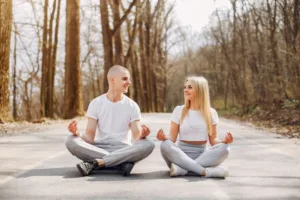
How Meditation Can Enhance Emotional Connection in Relationships
In recent years, meditation has gained widespread attention for its profound impact on personal well-being. But did you know it can also play an important
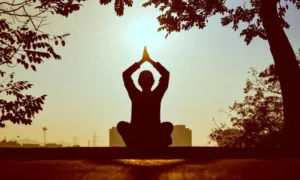
Embracing Stillness: 4 Simple Meditation Techniques for Overcoming Cravings
Cravings can be relentless, whether you’re dealing with the urge to eat unhealthy foods, the pull of an addictive substance, or even the compulsion to

Sleep Better, Live Better: Meditation for Insomnia Relief
Insomnia affects millions of people worldwide, leading to various health issues such as fatigue, irritability, and a weakened immune system. One effective method to combat
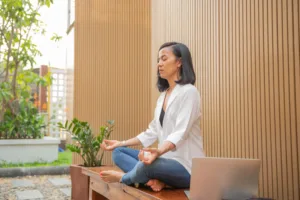
Clarity Amidst Chaos: How to Use Meditation for Concentration and Focus
Let’s talk about why meditation for concentration and focus is important. Focus is a crucial aspect of daily life that allows individuals to concentrate their
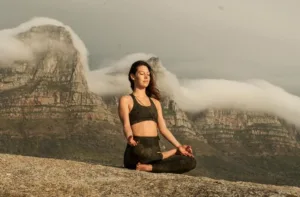
Meditation for Emotional Resilience: A How-to Guide
Meditation is a powerful tool that can help build emotional resilience. In our daily lives, we encounter various stressors and challenges that can impact our

